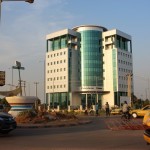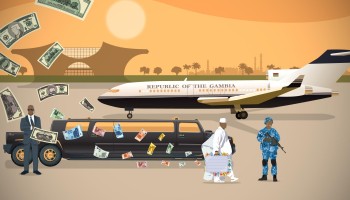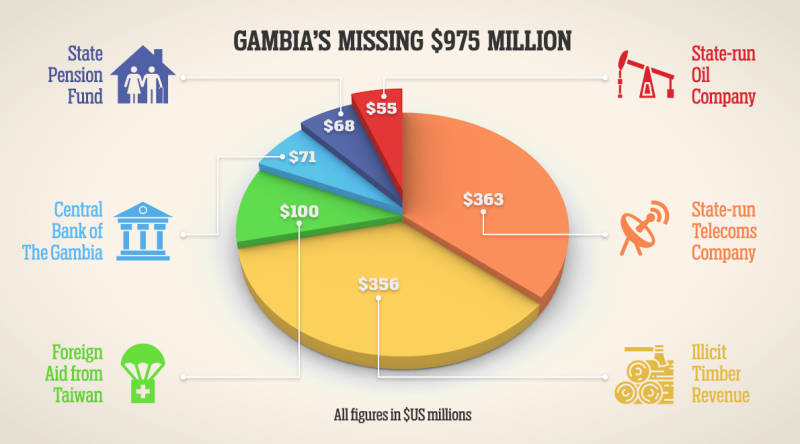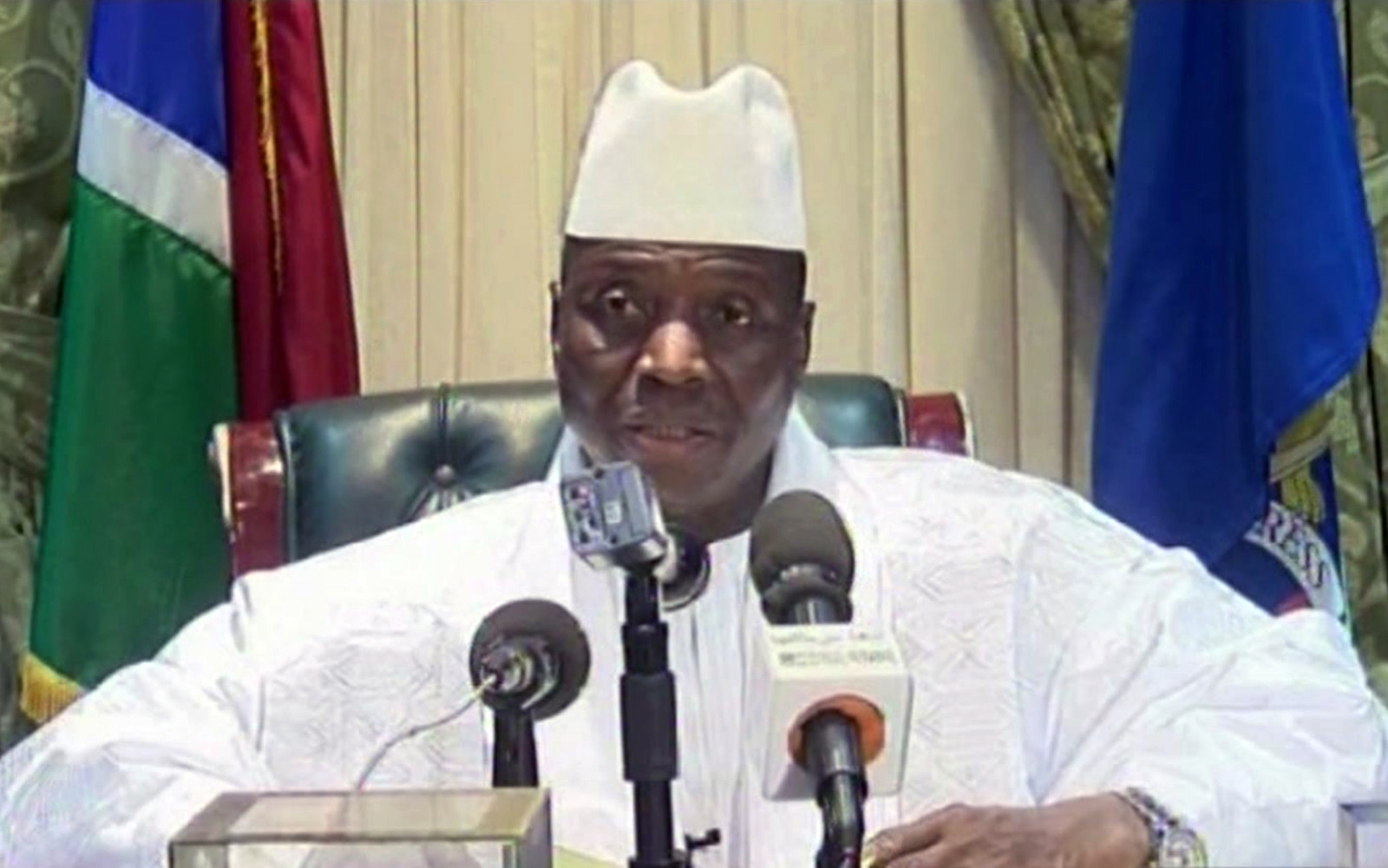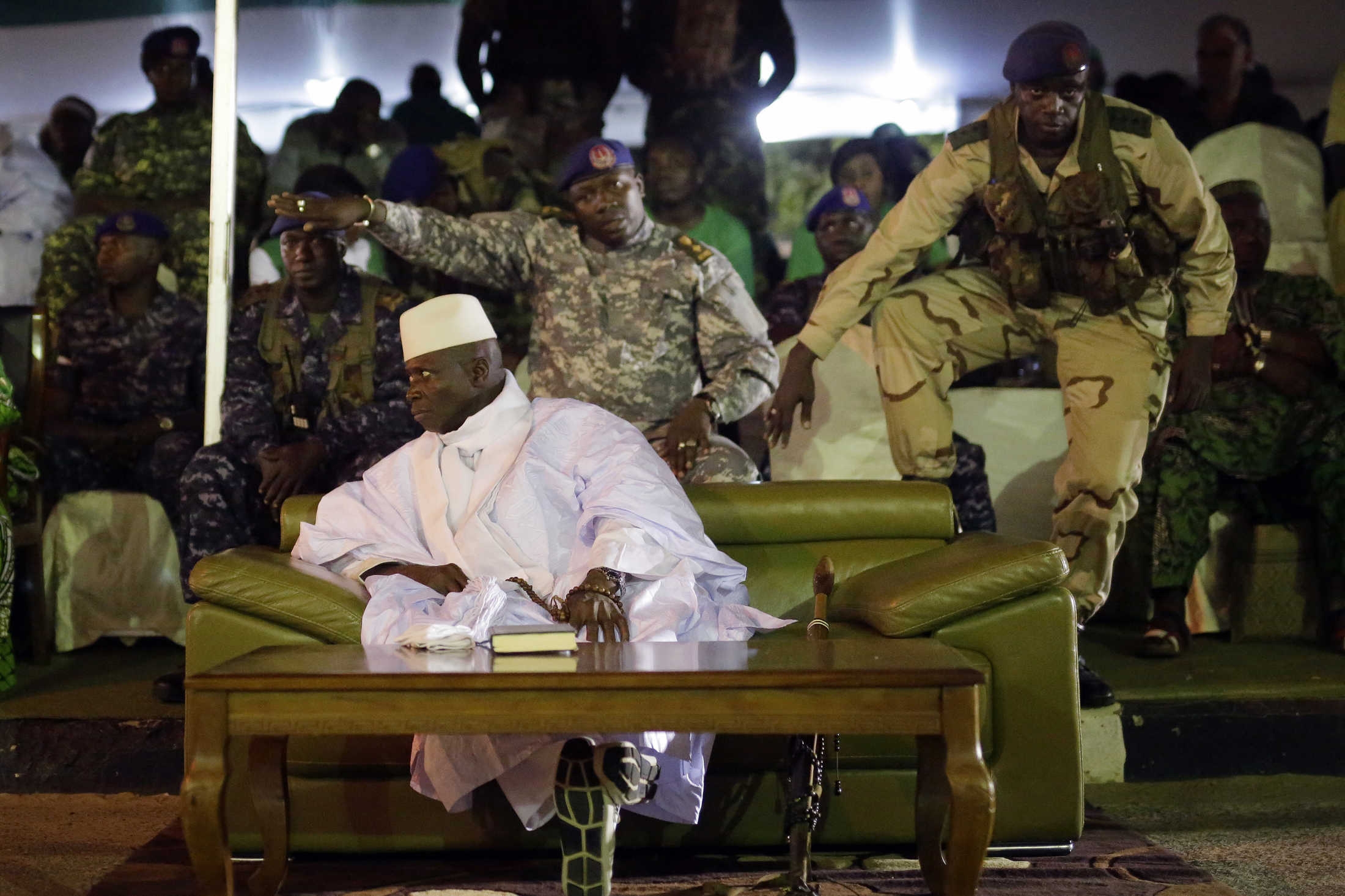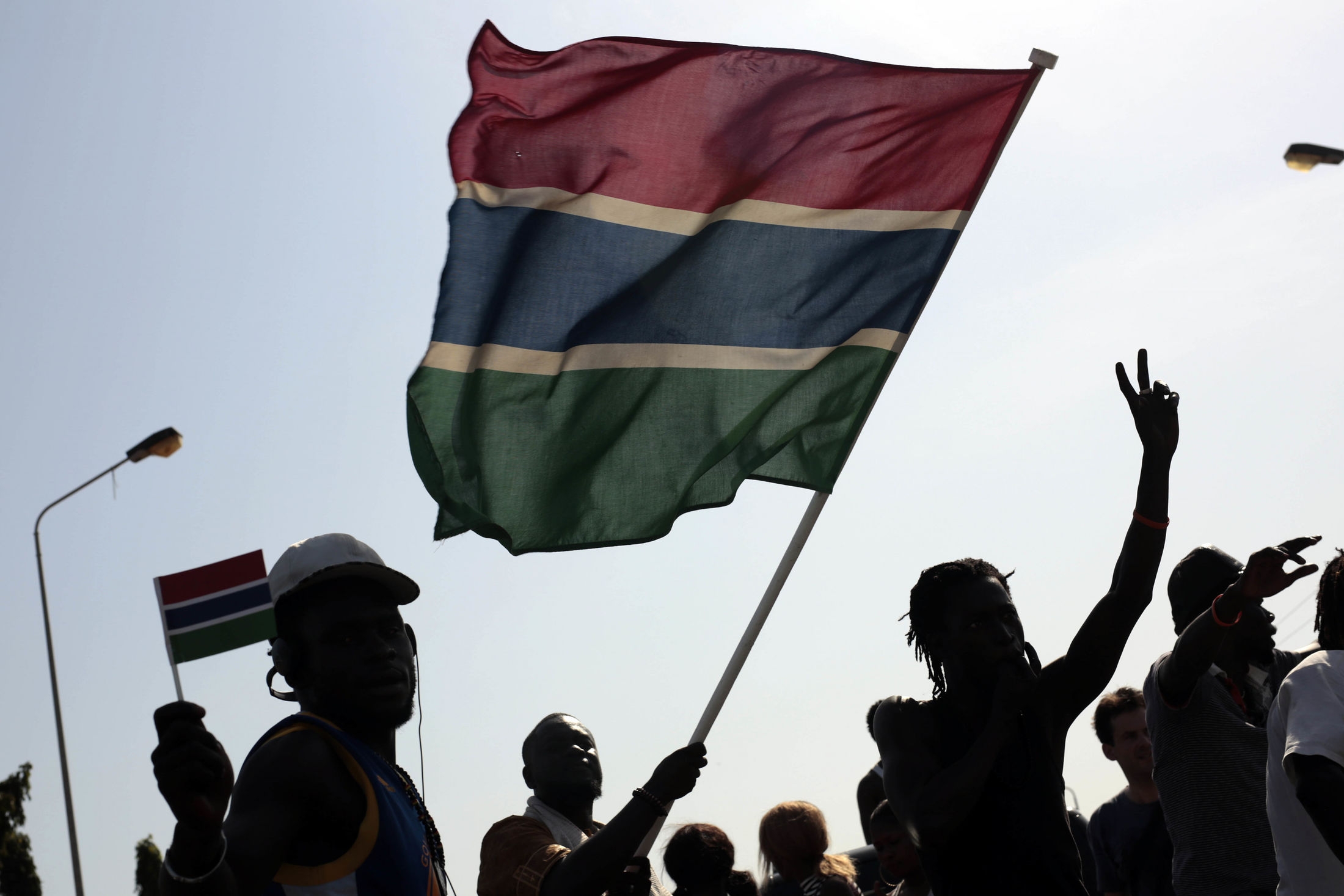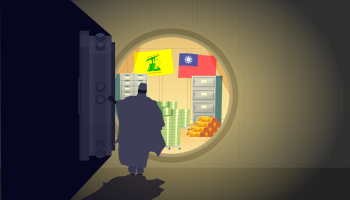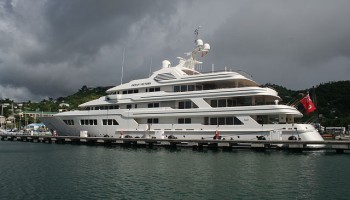Gambia’s former President Yahya Jammeh orchestrated the embezzlement of nearly US$1 billion of public funds and illegal timber revenue during his 22-year rule, looting the treasury in a long-running conspiracy that crippled one of the world’s poorest countries.
While president of the compact West African state of 2 million, Jammeh frequently drove his black stretch Hummer from his official residence in Banjul, the capital, to a lavish private estate in his home village of Kanilai.
His route took him past the central bank, the social welfare office, and the headquarters of the state telecom company. These were some of the institutions Jammeh pillaged by elevating privileged civil servants to prominent positions and empowering a group of corrupt businessmen led by a key Hezbollah financier.
Thousands of documents obtained exclusively by OCCRP lay bare for the first time the massive scale of Jammeh’s corruption. They show how he hijacked government funds and departments, set up private accounts at the central bank, and built a patronage network while ruling the country through a combination of guile, unbridled power, and violence.
What was not withdrawn in cash by Jammeh’s officials or funnelled to bank accounts controlled by the president went to businesses that received lucrative contracts (or for unknown purposes). Some was sent to foreign shell companies about which little is known. The transfers may have violated Gambian law.
Just how much of the great Gambian heist ended up in Jammeh’s own pockets — through offshore accounts or bags full of cash — is still unknown.
Adama Barrow, the country’s current president, estimated in 2017 that Jammeh stole about 4 billion dalasis ($90 million) from public coffers. An official investigation known as the Janneh Commission of Inquiry is currently examining financial misconduct during his rule. And at the end of last year, the United States announced that Jammeh had been banned from entering the country, citing evidence that he had been involved in “significant corruption.”
The documents analyzed by OCCRP show a web of fraud that far exceeds the figure offered by Barrow, who defeated Jammeh at the polls in 2016 but was only able to oust the former president after neighboring states threatened a military intervention.
“He ran the country like an organized crime syndicate,” said Jeggan Grey-Johnson, a Gambian activist and communications officer at the African regional office of the Open Society Foundation, a pro-democracy and good governance organization.
“Jammeh was the worst of dictators, but because he ruled a nobody country, nobody cared,” Grey-Johnson said.
In total, Jammeh and his associates looted or misappropriated at least $975 million. Among their biggest targets:
$363.9 million from the state-run telecoms company;
$325.5 million in illicit timber revenue;
more than $100 million in foreign aid and soft loans from Taiwan;
$71.2 million from the Central Bank of The Gambia;
$60 million from the Social Security and Housing Finance Corp., which manages disability, housing, and pension payments; and
$55.2 million from the state-run oil company.
Jammeh spent some of the stolen money on his palace in Kanilai, where he had his own private mosque, built a jungle warfare training camp, and kept camels, hyenas, zebras, and other exotic animals. The looted funds also supported a lavish lifestyle that Jammeh’s average official monthly government salary of about $6,000 could never sustain.
Other spending was designed to portray Jammeh as a benevolent and generous ruler, but not typically in ways that benefitted ordinary Gambians, who eke out a living in an economy that is literally dependent on peanuts, a top export. In 2010, using diverted money, Jammeh held a tribute concert for Michael Jackson after the pop superstar’s death. He also hosted a Miss Black USA beauty pageant in Gambia using $1.1 million illicitly diverted from the Port Authority.
The spending did little to address Gambia’s needs. The country has poor health care, few basic services, and under 1,000 km of paved roads. According to the World Bank, its external debt at the end of 2017 was $489 million — less than the amount Jammeh allegedly stole.
The former president gave himself five titles, insisted he could cure AIDS (but only on Mondays and Thursdays), and proclaimed that he would stay in power for a billion years if Allah wanted him to. He is now in exile in Equatorial Guinea, where he allegedly spends his days on a farm carved out of the jungle.
Ruling with an Iron Fist
The United Nations criticized Jammeh during his final election campaign for threatening to kill off the country's most populous ethnic group — the Mandinkas — and put them "where even a fly cannot see them.”
The sentiment was typical of a president who ruled through terror. At the center of his ability to strip Gambia of its meager wealth was Jammeh’s ruthless control of the government and its institutions. After capturing power in a bloodless coup in 1994 at just 29, he quickly deployed an array of official and unofficial security forces to silence dissent.
The Jungulers, an unofficial unit of about 40 men largely drawn from the Presidential Guard, carried out the most egregious offenses. In its 2015 report on Gambia, “State of Fear”, Human Rights Watch detailed accusations that included “enforced disappearances,” torture of political opponents, the summary execution of more than 50 African migrants, and the murder or disappearance of two journalists.
In a climate of fear, and with the complicity of a powerful circle in and out of the government, Jammeh’s brazen corruption continued unchecked for more than two decades.
Merely questioning Jammeh’s often erratic rule could result in entire departments being seized. When a senior official at the state-run oil company questioned the president’s office on whether its income could be exempt from taxes, Jammeh responded by seizing control of the company’s bank accounts and diverting its funds for his use.
His micromanagement of government affairs allowed him to exert “complete control” over Gambia, said Fatou Camara, who twice served as Jammeh's press secretary between 2011 and 2013.
“Every minister would wait for him before they made decisions,” Camara said. “Everything had to wait for the Office of the President to agree."
Jammeh’s human rights abuses and corruption went largely unchallenged by the international community because of his country’s small size and relative obscurity. A wave of violence across West Africa during his reign — in Ivory Coast, Liberia, and Sierra Leone — also helped him fly under the radar.
"The Gambia wasn't even like a back-burner issue — it was a backwater issue,” said Cameron Hudson, a former West Africa analyst for the CIA.

The ‘Number One Bank’ as a Slush Fund
The Central Bank of The Gambia was known as the “number one bank” among Jammeh’s staff because they knew its coffers would continually be replenished with public money.
Central banks are only supposed to regulate local banks, control currency in circulation, and set interest rates. Typically, individuals can’t have accounts. But Jammeh treated Gambia’s central bank as his personal slush fund.
Much of the time, the money he stole flowed electronically between domestic and foreign accounts. But sometimes the cash literally traded hands. Beneath the hum of air conditioning units in a loading bay on the central bank’s east side, presidential aides were known to shove suitcases stuffed with dollars, euros, and other currencies into waiting vehicles, according to testimony received by the commission of inquiry. The official investigation, led by lawyer Surahata Janneh, has not yet released its final report.
On one occasion, when Jammeh wanted to withdraw cash from the central bank, his office wrote directly to the bank’s second deputy governor with a blunt request that circumvented lawmakers and regulators. The bank complied.
Amadou Colley, the central bank’s governor from 2010 to 2017, told the commission that Jammeh and his cronies exerted significant control over the institution. Government records, testimonies, and directives show senior bank officials routinely allowing the president’s office unfettered access.
Colley, who declined to comment for this story, testified that he saw officials close to the president withdraw funds without proper paperwork. Able to obtain withdrawal notes from Jammeh’s office only occasionally, he resorted to accepting hastily-written statements from those retrieving the money that they had been “directed by President Jammeh [or] the Office of the President to make this withdrawal.”
Documents obtained by reporters show that Jammeh diverted over $71 million from the central bank’s reserves in just a few years. He used three main techniques: hijacking the bank’s accounts, creating new accounts on which he and his chosen aides were sole signatories, and using dormant accounts (which are seldom found at well-managed central banks). Sometimes he ordered the withdrawal of cash from accounts without any funds, causing them to become overdrawn.
Accounts such as the Consolidated Revenue Fund received millions of dollars every year from income taxes and other sources. There is little accounting for how money from the fund was spent between 2007 and 2016, despite laws that require parliamentary approval of expenditures.
Thousands of internal bank documents reviewed by OCCRP revealed other major accounts Jammeh plundered.
They included:
The International Gateway Account: This account received revenues from Gambia’s state telecommunications operator, known as Gamtel. The practice of collecting such revenues, earned from long-distance telephone calls and internet services, occurs in every country. In Gambia, however, a disproportionate 82 percent went to private companies through secret contracts that bypassed the country’s regulatory body. About $363 million disappeared this way. The remaining 18 percent which did land in the account was largely withdrawn by Jammeh’s office without explanation. Among other things, the president spent the money on cattle, vehicles, and extravagant carpets.
The Special Vision Account: Once the International Gateway account was emptied, Jammeh turned to this account, also funded by Gamtel revenues and intended to finance his development plan for Gambia. From July 2014 until January 2017, Jammeh’s office diverted about $43 million — with $35.7 million taken as cash. Jammeh’s close business associates were among the beneficiaries. Other expenses included doctors’ salaries, a donation to fight the West African Ebola outbreak, and funding for Jammeh’s personal charitable foundation. The last transaction occurred two days after Jammeh went into exile in 2017.
The State Aircraft Fund: This state travel fund was financed by donor aid from Qatar, tax revenues, and other sources. Jammeh’s office withdrew cash from the account without stating any purpose and used it to purchase a luxury jet, buses, and vehicles from a close associate.
The State Security Account: This account was set up by Jammeh’s office with no declared purpose. About $466,000, or 95 percent of its funds, were diverted from another account called the Consolidated Revenue Fund and used for cash withdrawals, entertainment, travel, payments to Jammeh’s favorite wife Zeinab, and other expenses.
Mineral-related accounts collected royalty payments from private mining companies such as Carnegie, Sand Mining, Gamico, and Heavy Minerals. Though this money was intended for the Consolidated Revenue Fund, the payments fell under the control of the president’s office, which oversaw the use of $4.9 million.
The Office of the First Lady: There is no such office in Gambia, but Jammeh created this account, filled it with public revenues, and spent the entire $35,706.
The National Youth Development Fund: Dozens of scholarships were awarded to young African-American women who Jammeh brought to Gambia to compete in the 2007 Miss Black USA beauty pageant, which he hosted. The fund also paid for maintenance on Jammeh’s jet and other expenses. The source of the $4.5 million that passed through the account is unknown.
The Green Industry Account: Although the central bank is not allowed to open accounts for private entities, an account named Green Industry — presumably after a private company of the same name — was created. The source of the funds, which were illegally transferred to the company’s account at Trust Bank, is unclear.
The Fish Landing Account: Funded by revenue from a 10 percent fee on fish caught by trawlers in Gambian waters, this account received multiple requests from withdrawals from Jammeh’s office.
During Jammeh’s rule, the central bank became heavily indebted. One of his government’s first acts in 1994 was to take out a secret $25 million loan in the form of a bond. Decades of fraud, hidden debts in the form of bonds, and account manipulation followed, draining the bank of its revenues. Almost 40 percent of the bank’s spending went toward interest payments on debts, according to OCCRP’s analysis.
In a [2015 letter to the International Monetary Fund](/documents/greatgambiaheist/Letter of intent to IMF_2015.pdf), while Jammeh was still in power, central bank officials wrote that the institution remained highly indebted because of significant interest charges, bad investments, over-lending to the government, and violations of its own rules — described as “policy slippages.”
Today, the central bank remains in dire straits. The country owes lenders 130 percent of its gross domestic product, mainly due to “external arrears” incurred by the Jammeh administration, the IMF said in May 2018.
Jammeh’s manipulation of the central bank may have violated several of Gambia's laws, including the Government Budget and Management Accountability Act of 2004, the Social Security Act of 2010, and the Public Finance Act of 2014. He has not been charged with any crimes.
“Jammeh ran the country like it was his own,” said William Gumede, an economist and chair of the Democracy Works Foundation, a South African pro-democracy group. “Who can question you when everything is considered yours?”
Gambia’s current government did not respond to requests for comment. The government of Equatorial Guinea did not respond to requests to reach Jammeh.
The true scale of Jammeh’s thefts from the central bank may never be fully known.
Taiwan Led the Way, Hezbollah Followed
Jammeh's thirst for public money began soon after he captured power in 1994. In 1995, he recognized Taiwan's independence from China in a strategic establishment of diplomatic ties also made by several other African countries. In doing so, he opened the door to some $100 million in foreign aid.
The East Asian island's development assistance was deposited into a “Special 3M” donor aid account at Citibank, the New York-based lender. Documents show that $35 million of the funding was dispersed in less than two years.
In total, $58 million was processed, primarily by Citibank, meaning the account was presumably overdrawn. The bank transferred the money to just over 20 beneficiaries, allowing the funds to vanish into the accounts of Jammeh and his close associates, including Mohamed Bazzi, one of the country’s richest and most influential businessmen, whom Jammeh used as a middleman.
Bazzi, identified by the U.S. as a key financier for Hezbollah, introduced another financier who invested $35 million in Gamtel, Gambia's state-owned telecommunications provider. He and other Hezbollah-linked businessmen were the primary beneficiaries of oil and telecommunications monopolies worth more than $100 million.
Some of the world’s biggest banks — including Barclays, Citibank, HSBC Bank, and Standard Chartered — approved transactions for what would turn out to be Jammeh’s seizure of state funds for his personal use.
In a statement to reporters, Citibank declined to comment on possible legal violations of standard anti-money laundering, due diligence, and “know your customer” requirements as well as potential violations of U.S. laws regarding banking secrecy, corrupt practices and even terrorism laws.
Standard Chartered declined to comment and Barclays declined to comment on the record. HSBC did not respond to requests for comment.
Former World Bank anti-corruption specialist Richard Messick said U.S. law enforcement might have been working with the banks to monitor where the funds were going.
“It’s possible they reported the transactions to the authorities,” he said. “I know of cases where law enforcement authorities have ... ‘spooked’ the account holders ... so that they could see where it was going to. So that’s not all beyond the pale.”
“Assuming the banks didn't alert authorities to the transactions moving the money out of the accounts, they should have applied enhanced due diligence ... to ensure the money wasn't being laundered,” Messick said.
Keep Your Friends Close
None of Jammeh’s plundering would have been possible without the close network of advisers he posted to key positions and shuffled around at will. The aides, often used as signatories to bank accounts and loan agreements, played a key role in his money transfer schemes.
Jammeh’s right-hand man, Gen. Sulayman Badjie, was identified in commission testimonies as the president’s enforcer — both in politics and in business. Even as he ran the country as second-in-command and headed its armed forces, he also provided protection for Jammeh’s timber smuggling operation. Badjie could not be reached by reporters.
The secretary-general of the Office of the President, Nuha Touray, was a crucial intermediary between Jammeh’s office and various government departments. Documents obtained by reporters include directives Touray signed that authorized the seizure of bank accounts and the sacking of public officials who questioned orders.
In addition to Jammeh’s official salary, his personal bank accounts reveal that Bazzi paid Jammeh $500,000 a month for several months. Bazzi testified to the commission that he paid the sum to the president’s account for 20 months and the money was related to an incentive to the president for a telecommunications deal that Bazzi organized for his associate, Ali Charara, another Lebanese Hezbollah financier.
Bazzi did not respond to requests for comment.
Jammeh’s favored officials shared in his prosperity, but were also vulnerable to his propensity for violence and punishment.
Many officials who fell out of favor found themselves incarcerated alongside journalists, political activists, human rights campaigners, and those perceived to be gay or lesbian in the country’s notorious Mile 2 prison.
Touray told the commission that failure to carry out the president’s orders resulted in one of three consequences: “dismissal, imprisonment, or disappeared.”
(Click here to read more about Bazzi and Jammeh’s close associates.)
Exiled in Comfort in Equatorial Guinea
Jammeh’s plundering ended after his seesaw exit from power in 2016, a spectacle that briefly captivated the world. After losing the presidential election to Barrow, a former property developer, on Dec. 1 of that year, the strongman shocked the region by conceding defeat.
But in true Jammeh style, he quickly reversed course and rejected the outcome. As President-elect Barrow called for an investigation into human rights abuses and corruption under Jammeh’s regime, the outgoing president appeared to be buying time to get his affairs in order.
After seven weeks of negotiations, which brought several prominent West African heads of state to Jammeh's palace for talks, the embattled leader fled the country on Jan. 21, 2017, on a Falcon 900 private jet owned by the government of Equatorial Guinea and used by its president.
President Teodoro Obiang Nguema Mbasogo, known as Obiang, is a longtime friend of Jammeh. The two men have a similar propensity for using state finances for personal gain and quashing opponents. According to media reports, they even owned houses next to each other in Potomac, Maryland.
Once Jammeh arrived in Malabo, Equatorial Guinea’s island capital, Obiang granted him refuge from the chorus of human rights and anti-corruption campaigners who were seeking to put him on trial in the Hague for crimes against humanity.
Jammeh remains in Equatorial Guinea to this day, nearly 5,000 km from Banjul and the commission investigating him.
Back in Gambia, the people Jammeh hurt most are hoping for better times at the hands of the government of Barrow, his replacement. “We’ve been told that our pensions will be increased by 100 percent,” said Abubacarr Dem, 79, a retired civil servant who lives near the capital. “That’s good if it works out. For now, we haven’t seen it. I don’t even know whether they have enough money there for us.”
With additional reporting by Saikou Jammeh and Daniela Lepiz.


